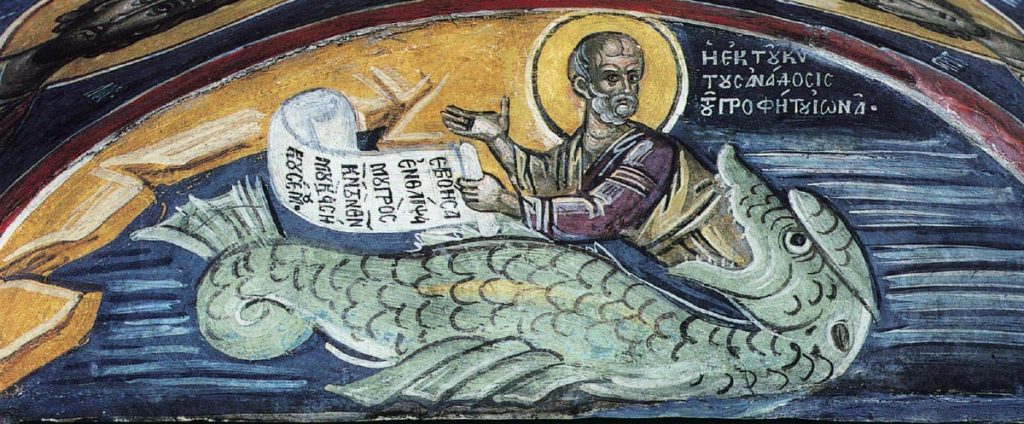
Previously I have writtend about the 30 Days of Discipline program by Victor Pride. It’s a great way to jumpstart your life through a dedication to physical fitness, productive work and self control. It’s a secular program however, and for those yearning for something more spiritual, particularly for Catholics, the Nineveh 90 Challenge is worth considering.
The name of the program, in brief, refers to the biblical city of Nineveh, where God sent Jonah (of Jonah and the whale fame) to proclaim that the city would be overthrown if its residents didn’t repent from their evil ways. The people listened, and everyone from the lowest peasant to the king himself put on sackcloth (a coarse, woven fabric) and began a fast in penitence. The city and its people were saved. (Jonah 3:3-10)
The act of mortification (subduing bodily desires) has a long tradition in Christianity. The most common form is fasting, but it can also include the limitation or elimination of other comforts, and in its most extreme form, self-flagelattion.
Modern society has deified the pursuit of pleasure, comfort and convenience. It has created the illusion that peace and happiness are to be found in luxury and excess. If we’re honest with ourselves we’ll acknowledge that it is never enough. Attaining the nice things we want gives us temporary satisfaction, but the emptiness we feel is never filled.
Perhaps the most compelling explanation for and answer to this conundrum is found in St. Augustine’s famous phrase about God, “Our hearts are restless, until they rest in you.”
Ironically, the path to draw closer to God leads through having less. One can go as far as withdrawing from society into monastic living, but a more practical and immediate alternative is to mortify the desires of the flesh, and allow God into the room we make for him.
Nineveh 90 – Ten Elements
- For these 90 days, resolve to let go of repetitive sin you struggle with (e.g., masturbation, over-eating, alcohol, etc.)
- Wear Brown Scapular (Scapular Medal allowed) – Akin to Sackcloth
- Daily Mass (This is more of an encouragement, as many cannot do this)
- Confession (at least once a month … immediately following grave sin)
- Support System: Create or join a “Nineveh 90 Squad” of 3-8 people. Meet 1-3 times per week (in person or online). Join together with an “Accountability Buddy.” Meet daily or, at least, 3 times a week.
- Daily Prayer
- Morning Offering
- Angelus (6,Noon,6)
- Rosary
- Holy Hour (or at least 20 minutes – does not need to be before the Blessed Sacrament. This is normally done at home or your favorite prayer space)
- Bedtime Prayers
- For 90 Days, Commit to …
- Regular and intense exercise (this may be one of the greater challenges for many)
- Seven hours of sleep is essential
- No alcohol
- No desserts & sweets
- No eating between meals
- No soda or sweetened drinks
- No television or movies (news allowed)
- Only music that lifts the soul to God
- No televised sports (one per week allowed)
- Limit recreational computer time (only use for personal needs and fulfillment. May be needed for Nineveh 90 too)
- 54 Day Rosary Novena (Basic Training in Holiness) – February 13 to April 7
- 33 Day Preparation for Consecration – April 10 (Monday of Holy Week) to May 12
- Marian Consecration – May 13, 2017. 100th Anniversary of Our Lady of Fatima
The program lasts 90 days until May 13, the 100th anniversary of the appearance of Our Lady of Fatima, one of the most amazing stories of the 20th Century. I’m still recovering from a cold, so I’m a bit limited in some respects, but I’m planning to follow the program as closely as feasible over the next 90 days.
Life goes through ebbs and flows. As I wrote several years ago, my hedonistic lifestyle had lead me to a breaking point. While my experiences certainly had a chastening effect on me, I feel that there is still plenty of room to grow. Having once been much more devoted to my spiritual and prayer life, I know that while it can be very challenging at times, it’s never a waste of time, and only holds open the possibility of learning more about yourself and drawing closer to God.
Religion and spirituality aren’t typically a focus of the manosphere, beyond secular works like Meditations by Marcus Aurelius. Books like these hold an important place in Western civilization, but I think they are only a first step. For anyone interested in looking into something even deeper, I highly recommend The Imitation of Christ by Thomas à Kempis. I’ll write a full review in the near future, but as the second most translated book after the Bible, it’s well worth your time, whether or not you’re a devout believer.




